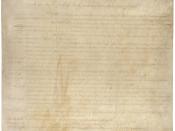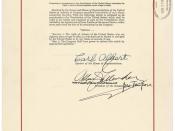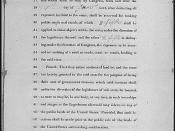The original Bill of Rights to the United States Constitution were submitted September 25, 1789 in an era before the advent of the telephone, television, computers or the automobile. Fast and easy widespread information sharing in seconds was unfathomable. The creators of the Bill of Rights could not have anticipated nor have foreseen the thorny issues that courts would face when trying to map the text and structure of the Constitutional Amendments onto "cyberspace" in this information age.
The following are examples of cases where the Amendments to the Constitution have been used or could have been used to defend court cases in computer ethics.
The First Amendment is arguably the Amendment that applies most frequently to computer ethics issues. The First Amendment assures the right to freedom of speech. The First Amendment guarantees that "Congress shall make no law...abridging the freedom of speech, or of the press." After all, what else is the internet, besides a medium for expression? The First Amendment was used to protest Senator Dan Coats's Bill to amend the Communications Decency Act to regulate this medium of expression.
His Bill aimed to make it a crime to publish on the internet any material that is "harmful to minors." The original Anti-CDA petition argued that this regulation, besides being expensive and impractical, would create an environment that was contrary to the Constitutional principles of free speech as guaranteed by the First Amendment.
All of the travelers on the "information superhighway" are involved in the transfer and sharing of information. The Fourth Amendment core concepts of privacy have been examined to determine how the regulations of search and seizure should be applied to personal computers.
James Maxwell, Jr. of the U.S. Air Force was convicted on Nov 21, 1996 of possession and transmission of child pornography. Apparently...


